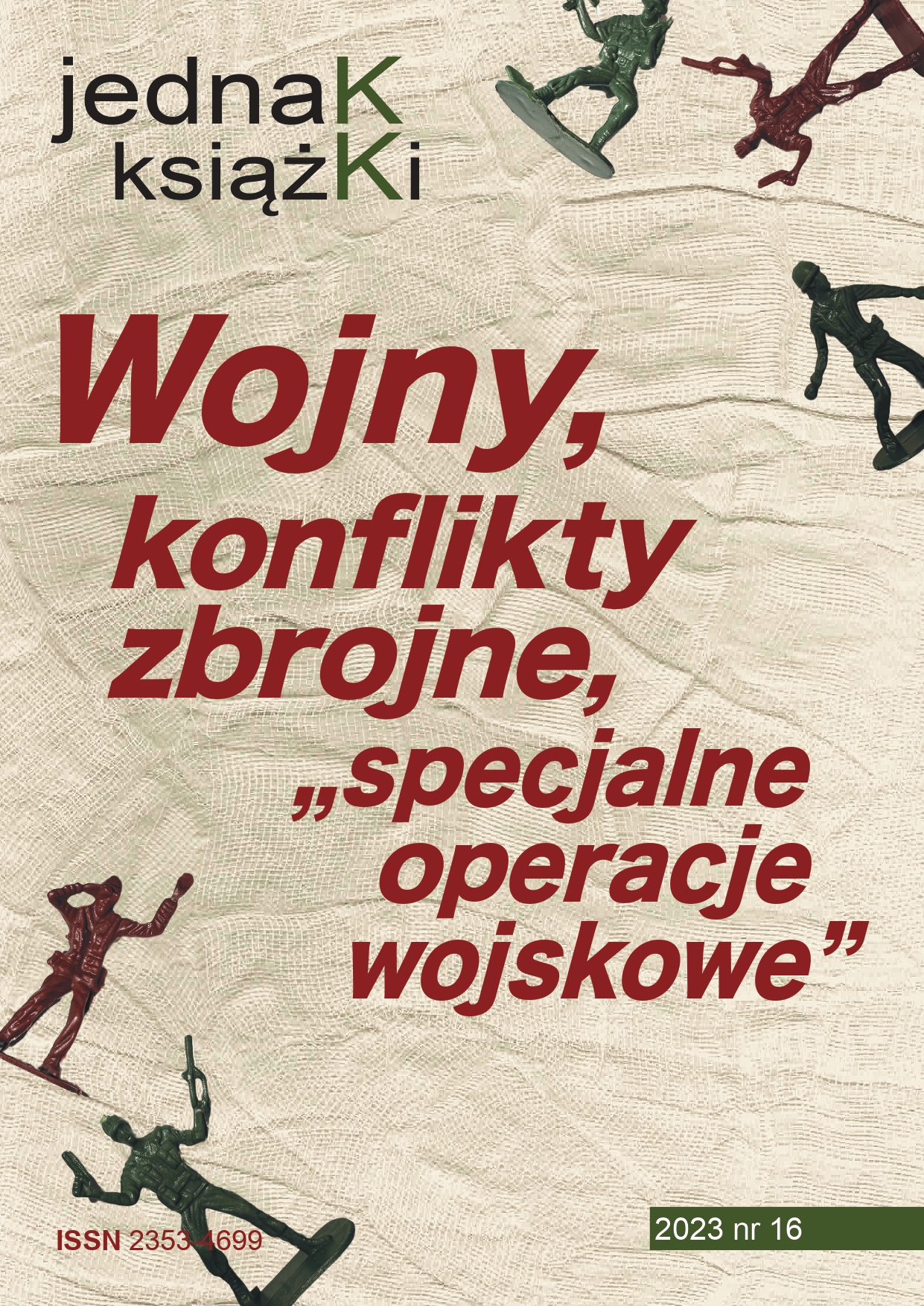Conscious Irish Fiction and the Repetitiveness of War: Transcultural Memories to Negotiate Peace in “Redemption Falls” and “TransAtlantic”
DOI:
https://doi.org/10.26881/jk.2023.16.08Słowa kluczowe:
Redemption Falls, TransAtlantic, peacebuilding, transcultural memory, warAbstrakt
Drawing on recent scholarship on transcultural memory and its role in peacebuilding, this paper explores the implications of entangling memories that belong to different pasts, places, and cultural groups in Joseph O’Connor’s Redemption Falls (2007) and Colum McCann’s TransAtlantic (2013). Both novels, written by authors interested in the notions of oppression and suppression of stories, are polyphonic texts that disrupt any single linear narrative by interweaving multiple storylines through constant movements across time and space. McCann’s focus shifts from the aftermath of WWI to the 1998 Belfast Agreement, while O’Connor’s novel deals with the American Civil War and Irish nationalism; both recount episodes of the Great Famine, the ensuing emigration, and the history of Abolitionism. Hence, painful memories of the Irish mingle with the mnemonic repertoires of those who suffered the abominations of slavery or internecine conflict in an attempt to give voice to the marginalised and highlight bonds between (apparently unrelated) groups of people. Moreover, this convergence of inherited memories binds the past with the present and the future, as the recollections have echoes of contemporary conflicts and global phenomena involving Ireland, whose role in them is implicitly interrogated. By fusing significant cultural memories across generations and spaces, these novels assert the ‘historical duty’ to remember to promote negotiation and mutual understanding between different cultural groups today. This paper, therefore, will first offer an overview of contemporary Irish fiction, characterised by an original world-facing, rather than nation-focused, outlook. Second, it will undertake the analysis of the selected novels to contribute to the ongoing discussion about the potential of literature to build sound knowledge of diverse human experiences and, as a consequence, promote peace.
Downloads
Bibliografia
Bruck P.A., “Crisis as Spectacle: Tabloid News and the Politics of Outrage”, in: Media, Crisis and Democracy: Mass Communication and the Disruption of Social Order, eds. M. Raboy and B. Dagenais, London, 1992, pp. 108–119.
Carregal-Romero J., The Irish Female Migrant, Silence and Family Duty in Colm Tóibín’s Brooklyn, “Etudes Irlandaises”, 43, 2 (2018), pp. 129–141.
Corporaal M., Moving Towards Multidirectionality: Famine Memory, Migration and the Slavery Past in Fiction, 1860-1890, “Irish University Review”, 47, 1 (2017), pp. 48–61.
Deignan T., Of War and Forgiveness. (‘Redemption Falls: A Novel’), “America”, 197, 9 (2007), p. 28.
Duckworth, C.L., History, Memory, and Peace Education: History’s Hardest Questions in the Classroom, “Peace & Change”, 40, 2 (2015), pp. 167–193.
Ferriter D., What If? Alternative Views of Twentieth-Century Ireland, Dublin, 2006.
Garcia A.L., ‘There Has Been a Celtic Tiger of Fiction’: An Interview with Claire Kilroy, “Estudios irlandeses”, 13 (2018), pp. 158–164.
Greene N.P., An Interview with Joseph O’Connor, “Xavier Review”, 28, 1 (2008), pp. 5–7.
Harte L., Reading the Contemporary Irish Novel, 1987–2007, Chichester, 2014.
Harte L. and Parker M., Contemporary Irish Fiction: Themes, Tropes, Theories. New York, 2000.
Hirsch M., The Generation of Postmemory: Writing and Visual Culture After the Holocaust, New York, 2012.
Hutcheon L., A Poetics of Postmodernism: History, Theory, Fiction, London 1988.
Jabri V., War and the Transformation of Global Politics, Basingstoke and New York, 2007.
Langan S., The Power of the Past: Joseph O’Connor, “Irish America”, April–May (2012), https://www.irishamerica.com/2012/03/joseph-oconnor-interview-ghost-light/ [access: 13.05.2023].
Mara M. and Mara A., Ireland on the Waves: Colum McCann’s ‘TransAtlantic’ as Intergenerational Female ‘Immram’, “Nordic Irish Studies”, 14 (2015), 19–36.
Masalha N., The Palestine Nakba: Decolonising History, Narrating the Subaltern, Reclaiming Memory, London, 2012.
McCann C., “Anonymity”, in: The Novelist’s Lexicon: Writers on the Words That Define Their Work, ed. V. Gillet, New York, 2010, pp. 4–5.
McCann C. “Foreword”, in: Fire and Forget: Short Stories from the Long War, ed. R. Scranton, M. Gallagher, Boston, 2013, pp. vii–xii.
McCann C., TransAtlantic, London, 2013. McEvoy-Levy S., Peace and Resistance in Youth Cultures Reading the Politics of Peacebuilding from ‘Harry Potter’ to ‘The Hunger Games’, London, 2018.
Mianowski M., The Space In-Between in Colum McCann’s Novel ‘TransAtlantic’, “Études Britanniques Contemporaines”, 47/2014, https://journals.openedition.org/ebc/1810 [access: 15.10.2023].
Moynihan S., ‘War Is Not a Map’: Irish America, Transnationalism, and Joseph O’Connor’s ‘Redemption Falls’, “Comparative American Studies”, 6, 4 (2008), pp. 358–373.
Narrative 4, https://narrative4.com/ [access: 15.10.2023].
Ó Gallchoir C., Modernity, Gender, and the Nation in Joseph O’Connor’s ‘Star of the Sea’, “Irish University Review”, 43, 2 (2013), pp. 344–362.
O’Connor J., Redemption Falls, New York, 2008.
Rigby K., Reclaiming Romanticism: Towards an Ecopoetics of Decolonization, London, 2020.
Robinson M. “Cherishing the Irish Diaspora. An Address to the Houses of the Oireachtas”, 2 February 1995.
Rose D.B., Reports from a Wild Country: Ethics for Decolonisation, Sydney, 2004.
Rothberg M., Multidirectional Memory: Remembering the Holocaust in the Age of Decolonization, Stanford, 2009.
Schultz M., Haunted Historiographies: The Rhetoric of Ideology in Postcolonial Irish Fiction, Manchester, 2016.

 Uniwersyteckie Czasopisma Naukowe
Uniwersyteckie Czasopisma Naukowe





